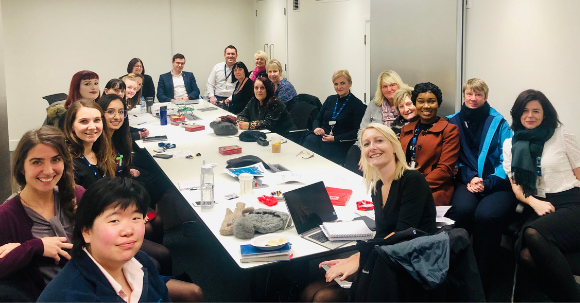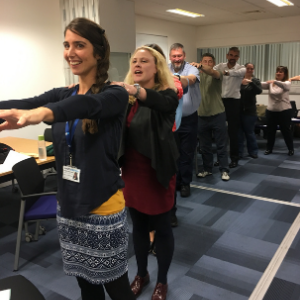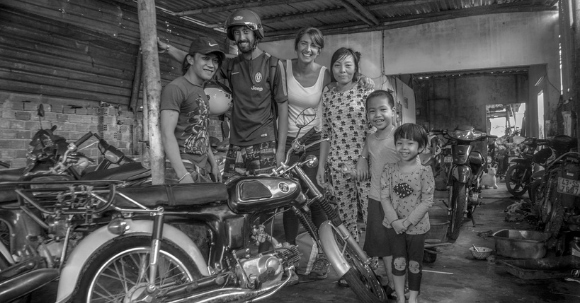Natalie Sparrow is leading some great Diversity and Inclusion initiatives at Southeastern Railway. For International Women’s Day, she and Colleague Network Group, Women in Rail Empowerment (WIRE) launched a campaign to help tackle the stigma surrounding menstruation. This included providing free sanitary products. So far, the feedback has been positive and it’s been a welcomed move.
We also had a chat with Natalie about the other D&I initiatives she is leading. We walked away completely inspired by what Southeastern are doing to create an inclusive environment.
Starting a menstrual movement
More and more employers are taking a stance on breaking down the stigma around menstruation. We asked how this movement started for Southeastern.
“When discussing period positivity in WIRE, we discovered that 86% of women started their periods without having any sanitary products on hand. Having free sanitary products in the bathrooms helps to take away the stigma. We launched this initiative on IWD across ten locations.”
Offering free period products is a fairly new concept for many workplaces — but the case for it is strong, and we are excited that Southeastern are paving the way for period positivity. Natalie believes employers have a duty of care to create inclusive work environments that support reproductive health.
“Period products are a necessity — just like soap and toilet paper — yet they’re not as readily available. Just about every woman remembers the time they were caught without a pad or tampon. Getting your period at work is disruptive and affects productivity and wellbeing.”
Understanding symptoms of menopause
Another matter discussed in WIRE was how to create more awareness on the symptoms of menopause and how managers can best support them.
Often the signs of menopause are too often under-recognized, undervalued and not taken seriously. There are also psychological symptoms such as loss of self-confidence, low self-esteem, anxiety and depression.
“On average, women spend nearly one-third of their life being postmenopausal. The retirement age is increasing, which means the symptoms of menopause last a lot longer.”
As women make half of our overall population, it makes perfect sense to empower managers to open up this conversation.
“The feedback has been great! We’ve run a series of manager workshops and a separate session for non-managers. Managers are given a briefing guide to refer back to if they ever need to.”

Singing from the same hymn book
As part of Natalie’s D&I strategy, she implemented several colleague-led network groups such as WIRE, LGBT+ sOUTheastern, Mind the Gap (mental health), CultuRAIL, and recently, one to support colleagues with a disability. We were delighted to learn that Southeastern has a company choir too!
“The choir encourages social wellbeing and inclusion. It’s a very gender-balanced choir where you get to meet colleagues from all over the company who you wouldn’t normally work directly with.”
Natalie shared that these colleague network groups were formed at different stages, meaning some organically had more engagement and input than others.
“We’re always asking for feedback from colleagues and ensuring there is continual alignment with the objectives and mission of the groups. Since these groups are championed by colleagues, they feel safe to share their thoughts.”

The journey onwards and upwards
Natalie has worked for Southeastern for four years. She enjoys making a difference in her role. Knowing first-hand what it feels like to be excluded at work, she is proud to contribute to the everyday inclusion for her colleagues.
“I have experienced the negative effects of making people feel they don’t matter at work, and I think this has been an experience for many underrepresented groups in the workplace. I really care about changing this, helping to amplify voices, removing stereotypes and working practices that are not designed for everyone.”
“I’m passionate about celebrating diversity, educating and raising awareness on our differences by bringing people together. This is how my career developed, and my personal interest led me to a career in engagement and inclusion.”
We asked Natalie what was coming up next. She says,
“There is a monthly D&I calendar that helps keep the conversation and momentum going. We have a number of Southeastern trailed delegates who deliver unconscious bias training on an ongoing basis in-house.”
Natalie humbly warns that executing a D&I strategy does take a lot of patience. The secret to Southeastern’s D&I success is having strong leadership support at the table.
“We have an open and honest culture driven by our Executive Team, who role model our everyday inclusion and feedback culture. We have a simple and clear vision, mission, and values that are well embedded and understood by colleagues.”
“We are striving to create a workforce culture where everyone can come to work, feel safe to be themselves, and for all colleagues to make each other feel welcomed, valued and respected. A key focus in our strategy is to increase diversity at every level in the company and we have targets to help our gender balance and for more ethnic diversity, especially in senior management.”
Finding that balance
The pandemic has been challenging for everyone. Natalie is also passionate about leading a healthy and fit life. She (literally) balances things by practicing yoga. She not only wears the “HR hat” brilliantly — she is also a qualified yoga teacher, sound therapist and reflexologist. It was such a pleasure chatting with Natalie.
We look forward to hearing more of what’s to come at this inclusive employer.




